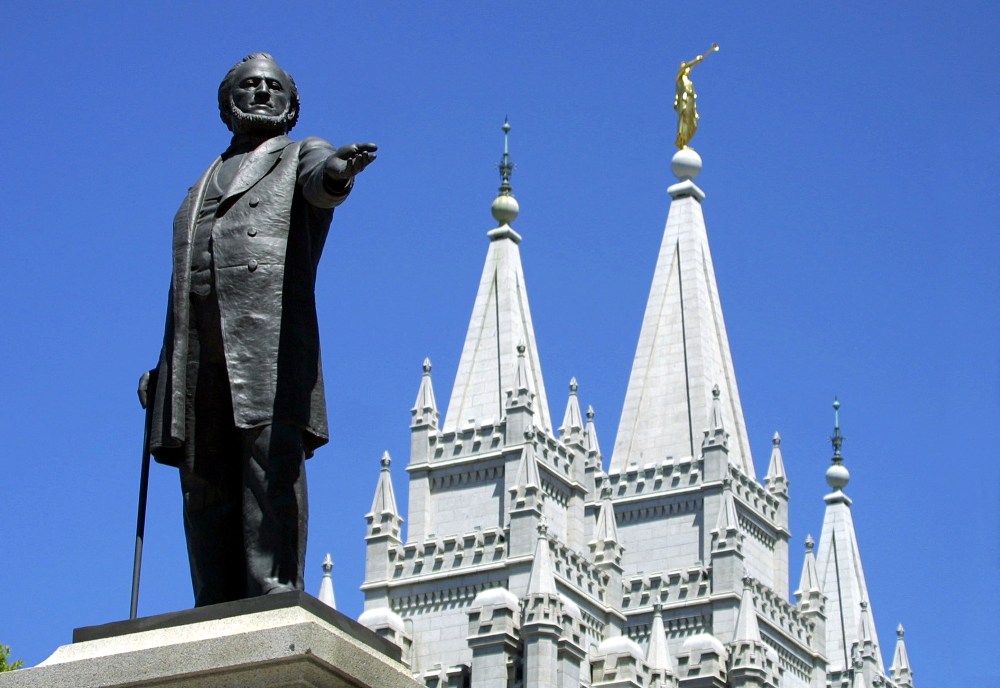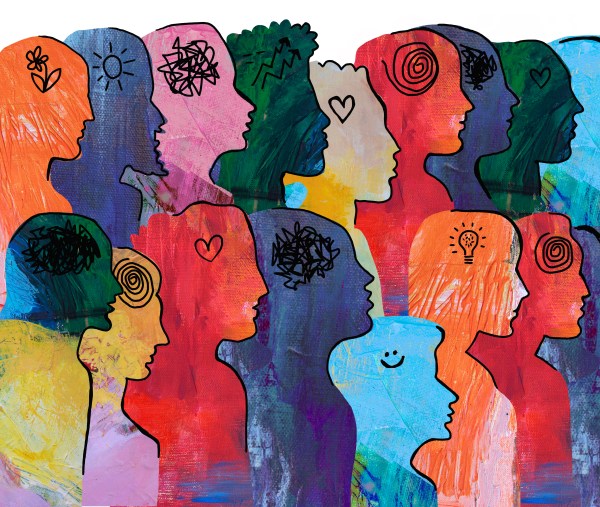Turn any article into a podcast. Upgrade now to start listening.
Premium Members can share articles with friends & family to bypass the paywall.
If there’s one thing I hate, it’s sweeping over-generalizations and stereotypes. That said, Mormons are awesome.
I’ve long said that if you had to rank demographic groups by the likelihood of their pulling over in the rain to help a stranger change a tire, Mormons would probably come out on top.
I disagree with Mormons on many things, though any theological disagreements are way down on the list of things that bother me. I’m talking about all that clean living. No coffee, no booze, no tobacco? No way.
A message from The Dispatch
Stay Ahead of the Curve With Dispatch Energy
The Dispatch’s newest weekly newsletter will dive into the politics, policy, and innovation shaping America’s energy future, presented by Pacific Legal Foundation. Featuring a rotating roster of contributors who are experts in their respective fields, each edition will feature incisive analysis on everything from oil and gas and permitting regulations, to renewables, climate, and the grid.
(I should pause for just a moment to apologize if I’ve given any offense for using the term Mormon. In 2018, Russell M. Nelson, the recently deceased head of the Church of Jesus Christ of Latter-day Saints, declared that the word “Mormon” was no longer acceptable. The decision came to him as a divine revelation. I generally try to defer to people and groups about what they want to be called, but as a journalistic matter, I think this is different. I’ve talked to many Mormons about this, and I’ve yet to meet one who takes offense at the term. And for reasons not worth getting into here, I think accepting the name change drags people into theological arguments that don’t help anyone, especially Mormons.)
As for the theology stuff, I’m reminded of Irving Kristol’s observation that Americans traditionally subscribe to what he called theological pluralism but moral conformity. He’d cite the fight over Utah’s statehood as an illustration of the point. Americans would not accept Utah as a state so long as polygamy was legal there. Indeed, the Republican Party platform of 1856 stated:
Resolved: That the Constitution confers upon Congress sovereign powers over the Territories of the United States for their government; and that in the exercise of this power, it is both the right and the imperative duty of Congress to prohibit in the Territories those twin relics of barbarism—Polygamy, and Slavery.
Utah applied for statehood a half dozen times and failed. But after the Church of Jesus Christ of Latter-day Saints issued its 1890 “manifesto” vowing to do away with polygamy, Americans were basically like, “Yeah, okay. Fine.” By 1896, Utah was a state.
As a non-paying reader, you are receiving a truncated version of The G-File. You can read Jonah’s full newsletter by becoming a member here.
We’ll come back to that.
The oldest hatred in a new mask.
There was a horrific attack on a Mormon church on Sunday. Reporting suggests that the murderer (he’s dead and obviously guilty, so I don’t feel the need to use “alleged”) hated the LDS church, believing it was the antichrist. In response to this news, there was a proliferation of anti-Mormon and pro-Mormon chatter on social media.
As I said, to the extent I can be “pro” a large demographic group without running afoul of my classically liberal aversion to talking about groups in blanket ways, I am pro-Mormon. Not for what they believe theologically, but because of how they behave morally and culturally.
What I find particularly fascinating about extreme anti-Mormonism is that it is overwhelmingly theological and abstract. I am not dismissing theological distinctions as “mere abstractions.” Abstractions can be extremely important. But there is something distinctly off-putting—one might even say evil—when theological differences morph into hatred toward a whole class of people solely for doctrines and not for what they actually do in service to those doctrines.
This is different than most hatreds that try to claim—often dishonestly, but not always—to link the beliefs to actions. Racists and antisemites will make claims about what “the blacks” or “the Jews” do. I will often disparage Communists for their beliefs, but my argument for doing so hinges on the things Communists actually do, have done, or want to do in the real world because of those beliefs. A Marxist poet who minds his business might amuse me, but who cares?
Think of it this way: If there were no such thing as Islamist terrorism, far fewer people would have a problem with Islam. Of course, animosity toward Islam because of terrorism can be very unfair to Muslims who are not terrorists and—again, as a classical liberal on these matters—treating peaceful decent Muslims as if they are responsible for the terrorist acts of others is wrong. Yes, the question of “support” for terrorism makes things muddier, but we’re going to stay clear of that rabbit hole.
The point is that Mormon haters can’t point to “Mormon terrorism” or make specious and invidious guilt-by-association claims the way racists and antisemites routinely do. Jews don’t use the blood of Christian babies to make their matzoh—a centuries-old blood libel—but at least that lie is a claim about something Jews supposedly do. Mormon haters don’t talk about “Mormon crime” or Mormon welfare cheats the way racists will talk about blacks.
Heck, I think the Amish are “wrong” about all sorts of things, but beating up an Amish person because of those disagreements strikes me as just about the dumbest thing imaginable. But even anti-Amish bigotry, to the extent it exists, seems to rest at least pretextually on things like Amish being conscientious objectors during wartime and, I dunno, slowing down traffic with their buggies. I struggle to think of what Mormons do that justifies disliking them, never mind hating them.
And yet there are a lot of Mormon haters out there. I was at National Review when we endorsed Mitt Romney for president in 2012, and the amount of email I got from self-professed evangelical Christians spewing the rankest bigotry against him, and Mormons generally, stunned me. Except for a few nasty jokes about undergarments, these notes were all about heresy, demonic this, antichrist that, and various theological “crimes”—but not anything that Mormons actually, or even allegedly, do. They just believe the “wrong” thing.
In this way, I think extreme anti-Mormonism may be the most reactionary form of hatred in America, because hating people solely for what they believe is the closest we get to ideas that powered the wars of religion in Europe, not to mention atrocities like the Albigensian Crusade. It’s premodern, tribal, reactionary, and evil.
But let’s get back to moral conformity.
Kissing cousins.
Last week, an amazing controversy erupted in the United Kingdom. The National Health Service (NHS), under the Labour Party government of Prime Minister Keir Starmer, posted guidance citing the “benefits” of cousin marriage and warning against “stigmatizing certain communities” for practicing consanguineous marriage. (SAT prep: “con” means “with, together” and sanguineous means “of blood.”) Among the purported benefits of cousin marriage: “stronger extended family support systems and economic advantages.”
British conservatives—to borrow an American journalistic cliché—pounced.
Now, unlike those who love the “pounce” framing, I’m pretty sympathetic to the pouncers. Critics believe the reason for the guidance was deeply political. Cousin marriage is widely practiced in the Arab and Muslim world—and in immigrant communities in the U.K. that hail from those regions, particularly Pakistan. Indeed, some estimates put the rate of cousin marriage among Britain’s Pakistani population between 38 and 59 percent. The suspicion is that Starmer’s government is unpopular and is trying to shore up support among these communities (which might explain, at least in part, his recent support for a Palestinian state). Or it may just be that the experts are letting their “woke” commitments trump science.
Regardless, the firestorm caused the NHS to delete the guidance and apologize.
The controversy is much more complex than “incest is icky.” Don’t get me wrong, I think incest is, in fact, icky. Indeed, one reason stems from the fact that incest can lead to genetic problems.
But in an abundance of fairness, it’s worth noting that those problems aren’t as dramatic as some think. If cousin marriage always yielded disastrous results, the custom probably would have never arisen or endured. Sibling marriage is far more dangerous, which is why it’s far less common.
Still, children of first cousins double their risks for certain maladies—which is bad—but chances are still in the low single digits. All things being equal, such children are more likely to have a range of developmental and other problems.
But that wasn’t the only reason the guidance was controversial: Immigrant groups often use cousin marriage as a means of bringing more immigrants from their extended kin networks to the U.K. And, if you hadn’t noticed, immigration is not super popular these days. Moreover, those kin networks tend to work against assimilation, insulating groups from the majority culture.
Simply put, the guidance felt to many like pandering to immigrant groups with conflicting values and customs in the name of diversity and tolerance at a time when many feel assimilation to the majority culture should be emphasized. There’s even a feminist angle. “Cultures that encourage first-cousin marriage have also been accused of oppressing women and being used as a tool to suppress personal freedoms,” The Telegraph reported with a kind of British understatement that can seem oddly blunt.
The reason I find this whole saga fascinating is that there’s a vast amount of scholarship arguing that the Catholic Church’s ban on consanguineous marriage helped fuel Western Civilization’s distinctiveness and prosperity.
Basically, the medieval church—for its own complicated reasons—declared an extended war on kinship networks, or clans, because they were a rival source of authority and fueled corruption within the Catholic Church itself. Nepotism is a term born from the church’s effort to prevent church leaders from diverting resources and power to their illegitimate children, or “nephews.” (Nepotism basically means “nephewism.”)
The church’s effort extended beyond nepotism within the church itself. By banning consanguineous marriage (often extending out to sixth or even seventh cousins) as well as practices like polygamy, arranged marriages within clans, and levirate marriage (where men married their brother’s widows), the church dissolved the sort of extended tribal networks that still define many non-Western societies.
Over time, as these prohibitions spread and took hold, people could no longer rely on clan ties for identity, protection, and economic support. Instead, social life increasingly centered on the nuclear family—husband, wife, and children—embedded in voluntary associations such as guilds, monasteries, and eventually civic institutions.
Freed from clan obligations, individuals became more mobile, more willing to trust and cooperate with non-kin, and more disposed to form impersonal, rule-based organizations. Anthropologist Joseph Henrich, in his book The Weirdest People in the World, links this to the growth of cities, commercial networks, and the eventual rise of Western legal and political institutions that emphasized individual rights and autonomy rather than inherited kinship roles. Alexis de Tocqueville covered some of this territory in Democracy in America, noting how in England, and even more so in the United States, clannish loyalty gave way to voluntary associations, market cooperation with strangers, and cultural celebration of individuals who break off from the family to make their own fortune and pursue their own destiny and happiness.
Of course, this plan eventually backfired on the church a bit, as the same trends ultimately led people to identify with their nation rather than the universal church. Nonetheless, I suspect the whole thing is awkward for some postliberal Catholics, given that it was the church that put the West on the path to liberalism long before the hated Enlightenment ever dawned.
I should note that cousin marriage remains legal in the U.K. and most of Europe. What offended so many people was the idea that the government would proactively encourage or promote cousin marriage at a time when momentum is building to ban it, as Norway recently did (and some in the U.K. are proposing).
I’m undecided on legal bans on cousin marriage for prudential reasons, though I could be persuaded to support them, and I certainly don’t think the push is outrageous.
I don’t think the health-risk argument alone is sufficient—but I also don’t like relying solely on the health-risk argument. I’m all for bans on sterile siblings getting married, despite the fact that there are no health risks involved. I have a high degree of tolerance for people living in ways I think are wrong. I can almost hear some people objecting to that sentence, but I don’t care. If you think there is a right way to live, as a matter of logic, you believe there is a wrong way to live. The only relevant questions are, “What are you willing to do about it personally?” And “what do you think the state should be empowered to do about it?” In my case, the answer to the first question is “not much.” My answer to the second question is, “More, but still not very much.”
I’m happy to share my opinion that people who spend their lives getting drunk or high and playing video games are living wrong. I’m open to some state-driven efforts to encourage people not to live that way, largely by providing information, better options, etc. But that’s a public policy question drenched in line-drawing concerns. But just because I am pretty libertarian about the role of the state doesn’t mean I’m a libertine when it comes to the culture. I have zero problem with a culture that says cousin marriage is bad or simply a culture that says cousin marriage might be fine for Pakistan, but it’s just not something we do here.
I’m glad that the United States said to Utah, “Look, you can be a state. But not if you practice polygamy.” And I’m glad the Mormons took the deal. And I’m fine with a culture that says, “You can be an American (or Briton), but you should know that we don’t think cousin-marriage is good and we’re not going to celebrate it.”








Please note that we at The Dispatch hold ourselves, our work, and our commenters to a higher standard than other places on the internet. We welcome comments that foster genuine debate or discussion—including comments critical of us or our work—but responses that include ad hominem attacks on fellow Dispatch members or are intended to stoke fear and anger may be moderated.
With your membership, you only have the ability to comment on The Morning Dispatch articles. Consider upgrading to join the conversation everywhere.